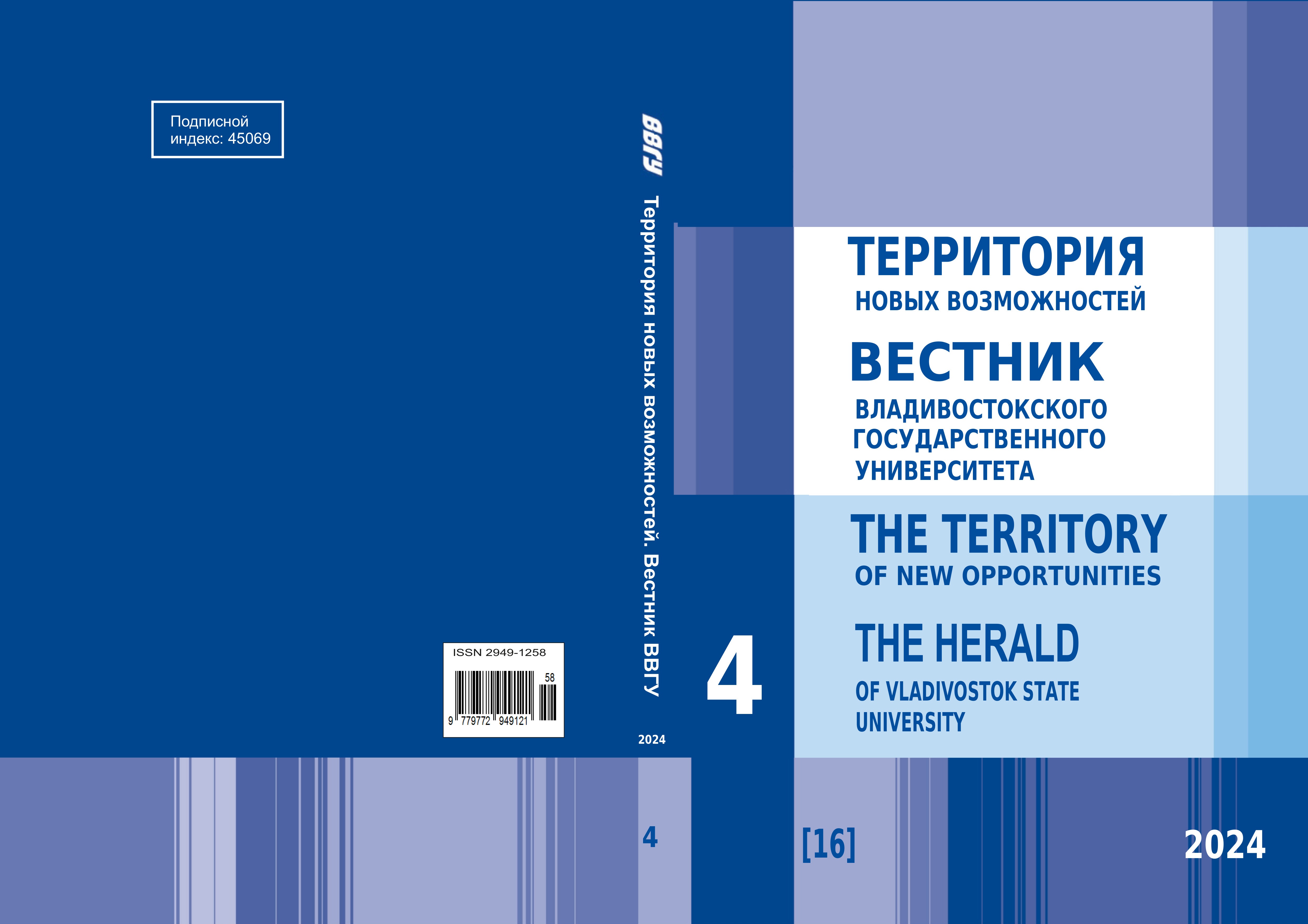Vladivostok, Vladivostok, Russian Federation
employee
Russian Federation
employee
Russian Federation
employee
Vladivostok, Russian Federation
The article highlights the formation of environmental culture as a section of environmental sci- ences (the area of interaction between nature and society) and interest in environmental problems among college students on the example of Vladivostok State University (VVSU). A preliminary analysis of environmental awareness among students of secondary vocational education (SVE) on the example of College of Service and Design (CSD) and IT-college (IThub Vladivostok) of Vladivostok State University was con- ducted. A survey of 333 first to third year students from various specialties in these colleges was carried out. The survey assessed students' knowledge of contemporary environmental issues, sources of environmental information, self-evaluation of environmental interest and self-education. The research results showed a number of general trends: among the respondents of the two colleges there is a high percentage of students who rarely think about environmental problems; in these educational institutions the majority of students assess their level of environmental competence as average and engage in self-education in the field of ecology sporadically or rarely. A significant number of students at the two colleges (approximately 15–20 %) could not unambiguously assess their level of environmental competence. Scientific novelty: using VVSU as a case study new data on the attitude of SVE students to environmental issues have been obtained. It was established that students' attitude to the environment does not meet social requirements; their own environmental competence is not perceived by students as significant in their self-education. Practical significance: the obtained results indicate the need to pay more attention to the development of environmental culture and environmental education of SVE students, to activate various forms of their research and project activities and a number of other tools. Assessment of the degree of awareness and interest of college students in solving environmental problems will be used to adjust the programs on environmental education and upbringing of student youth.
ecology, environmental awareness, environmental culture, environmental education, Vladivostok State University.
1. Ignatov S.B. Environmental competence in the context of education for sustainable development. Education and science. 2011; 1 (80): 22–32. EDN: https://elibrary.ru/NEKTXF
2. Kumanina N.Yu. Socio-environmental competence as a pedagogical category in the system of secondary vocational education. Bulletin of Altai State Pedagogical University. 2021; 3 (48): 16–20. DOI:https://doi.org/10.37386/2413-4481-2021-3-16-20 EDN: https://elibrary.ru/LKFMWZ
3. Ermakov D.S. Pedagogical competence in the formation of environmental competence of students: dis. ... Dr. ped. sciences. Moscow: Russian University of Friendship of Peoples; 2009. 405 c. URL: https://www.dissercat.com/content/pedagogicheskaya-kontseptsiyaformirovaniya-ekologicheskoi-kompetentnosti-uchashchikhsya (accessed date: 29.11.2023). EDN: https://elibrary.ru/QEAHWP
4. Matveeva A.V. Formation of environmental competence of students by means of project technology. Bulletin of Mininsky University. 2015; 2 (10). URL: https://cyberleninka.ru/article/n/formirovanie-ekologicheskoy-kompetentnostiuchaschihsya-sredstvami-proektnoy-tehnologii (accessed date: 27.11.2023).
5. Glazacheva A.O. Environmental competence as an integrative component of the personality of the future designer. Electronic periodical scientific publication "Bulletin of the International Academy of Sciences. Russian section". 2013; (1): 65–68. EDN: https://elibrary.ru/RQDMVP
6. Oreshkina T.A., Zabokritskaya L.D., Adyukova O.A. Analysis of the level of professional environmental competence of employees in public authorities of the Sverdlovsk region. Issues of state and municipal management. 2019;(3): 153–174. EDN: https://elibrary.ru/RKZQFU
7. Magamedov Z.A. Formation of environmental competence of SPO students. World of Science, Culture, Education. 2019; 5 (78): 216–218. DOI: https://doi.org/10.24411/1991-5497-2019-00090; EDN: https://elibrary.ru/NETYVZ
8. ozdnyakova A.I., Dobrotvorskaya S.G. Development on an integrative basis of the ecological culture of students in the process of studying natural sciences. Bulletin of the Leningrad State University named after A.S. Pushkin. 2023; (2): 36–51. DOI:https://doi.org/10.35231/18186653_2023_2_36 EDN: https://elibrary.ru/QWYTSB
9. Dryakhlova O.V. Development of a questionnaire to determine the level of environmental competence of teachers of a preschool educational organization. World of Pedagogy and Psychology: an international scientific and practical journal. 2017; 12 (17): 36–44.
10. Rudenko I.V., Naumavichyute K.A. Formation of the ecological culture of students of the pedagogical college. Baltic Humanitarian Journal. 2018; 7 (1 (22)): 273–275. EDN: https://elibrary.ru/YWKXET
11. College of Service and Design. URL: https://www.vvsu.ru/about/divisions/-academic/dep/id/1080
12. College of Information Technologies VVGU IThub Vladivostok. URL: https://vvsu.ithub.ru/#specs
13. IT College (IThub Vladivostok). URL: https://www.vvsu.ru/about/divisions/academic/-dep/id/1070 (accessed date: 27.11.2023).
14. Yarusova S.B., Ivanenko N.V., Shtabnoy I.P. Assessment of the environmental competence of students of secondary vocational education in IT professions (on the example of Vladivostok State University). Priority areas for the development of science and technology: reports of the XXXIII International. scientific-practical. conf.; under the general. ed. V.M. Panarin. Tula: Innovative Technologies; 2023. P 138–139. ISBN 978-5-6048512-7-2. EDN: https://elibrary.ru/YATCWB
15. Gordeeva I.V. Analysis of the effectiveness of environmental education of college students. Azimuth of scientific research: pedagogy and psychology. 2018; 7 (4 (25): 80–84. EDN: https://elibrary.ru/YTHGGT
16. Staff I.P., Yarusova S.B., Ivanenko N.V. Study of environmental awareness of secondary vocational education students on the example of Vladivostok State University. Issues of modern science: problems, trends and prospects (Year of teacher and mentor): mother. VII International. scientific-practical. conf. (Novokuznetsk, December 8, 2023). Kemerovo: FSBEI HE "Kuzbass State Technical University named after T.F. Gorbachev", branch of KuzSTU in Novokuznetsk; 2023. P. 154–156. ISBN 978-5-00137-428-2 EDN: https://elibrary.ru/NMUGQM
17. Nevzorov B.P., Nevzorov T.B. Some theoretical and historical aspects of environmental education in the media. Bulletin of Kemerovo State University. Series: Humanities and Social Sciences. 2017; (1): 18–27. EDN: https://elibrary.ru/YRICPD
18. Minaeva O.O. The role of the media in covering environmental issues. Young scientist. 2019; 19 (257): 337, 338. EDN: https://elibrary.ru/MPUAUN
19. Lukashevich O.D., Savelova P.D. Environmental susceptibility of students of a regional technical university and its diagnosis. Architecture of a multipolar world in the 21st century: ecology, economics, geopolitics, culture and education: Sat. mater. VII International. scientificpractical. conf. (Birobidzhan, April 30, 2022). Birobidzhan; 2022. P. 52–57. EDN: https://elibrary.ru/UXHFFX
20. Yarusova S.B., Mikhina I.S., Ivanenko N.V. Interuniversity exchange programs as one of the mechanisms for the implementation of continuous environmental education. Materials All-Russia. conf. on environmental education – 2022 (November 2–3, 2022). Tomsk: Integral binding; 2023. P. 127, 128.





